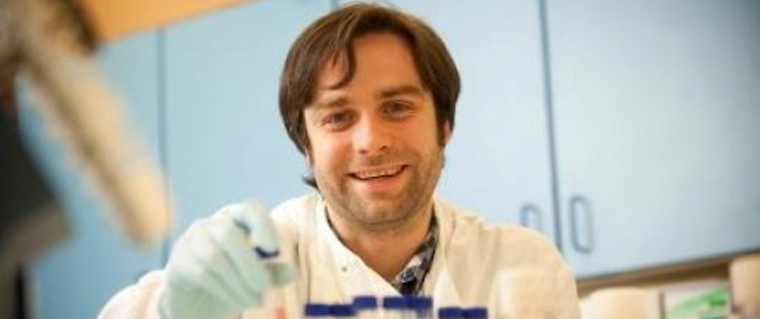
Case Study
Embedding a culture of innovation: Matt’s story
Date: March 11, 2013
2013 saw the first cohort of 12 postdoctoral researchers awarded the Postgraduate Certificate in Professional Innovation, a formal qualification designed to foster a continuous critical awareness of the challenges and opportunities on innovation management.
The Certificate was developed with support from colleagues Innovation and Impact Group (IIG) at Leeds University Business School.
Dr Matt Tomlinson, 31, was a member of the first cohort to be awarded the Certificate. Thanks to his skills in tissue engineering and strong technical knowledge of cell separation systems – following a spell as a biotech sales rep – he secured a postdoctoral position at Leeds in 2010. Working with Professor Jennifer Kirkham in Oral Biology, he was tasked with developing a new system of separating dental stem cells.
“It was Jennifer who put me forward for the Certificate,” he says. “Because I’d had a taste of working in a commercial environment, and with my current role involving critical reflection and ideas generation, I was interested to see where it might lead and what new things I could learn.
The research portfolio project he chose coupled professional and personal interest. “When I was younger I had a non-union fracture in my wrist which is now pinned together. Now, we’re looking at using scaffolds and patients’ own stem cells programmed to grow into bone to fuse a fracture that doesn’t heal; but there are many technical and regulatory challenges to making this a reality.”
Using his knowledge of cell separation techniques, Matt believes the idea of developing an automated system to harvest, sort, and immediately re-implant osteoprogenitor cells (cells that can be encouraged to grow into bone) into a fracture site is achievable. His project saw him collaborating with electronic engineers at Leeds to develop a system that can harvest enough cells for the procedure and Proof of Concept funding is currently being investigated to take the idea further.
“Thanks to the Certificate, I’m much more aware of the commercialisation process and the steps and hurdles involved. This is something I think all young researchers increasingly need knowledge of to progress in their careers, now that applied research is favoured for funding. I now have a broader set of skills and knowledge and a strong research project portfolio that are both useful for more industry-based research and would give me a head start if I decide to apply for a fellowship from a funding agency in the future.
Back to Case Studies
